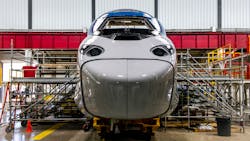Amtrak OIG report finds Amtrak improved management of New Acela program, but delays, cost increases likely
An Amtrak Office of Inspector General (OIG) audit found Amtrak has improved management of the New Acela program, but delays and cost increases are likely. The audit found the program is more than three years behind schedule. Current delays have resulted in significant cost increases, operational impacts and delayed revenue with the office explaining further schedule slippage would exacerbate the impacts.
Amtrak OIG identified two reasons for the current—and likely future—delays to New Acela:
- The vendor for the new vehicles, Alstom, has not produced a validated computer model that demonstrates the New Acela is safe to proceed with additional trainset testing. While federal regulations require Amtrak to submit to the Federal Railroad Administration (FRA) trainset performance predictions from the computer model showing that it is valid, Alstom is responsible for developing and validating the model.
- Of the 12 serial trainsets and 22 café cars Alstom has produced, all have defects. Although some defects are expected when producing a new trainset, Alstom’s schedule for addressing them is incomplete, and without more complete information, Amtrak cannot verify whether remediating the defects will impact the overall program schedule and the revenue service launch.
The issues Amtrak OIG identified on New Acela are similar to challenges that have occurred on other rolling stock acquisitions. Since Amtrak is planning a multi-billion- dollar program to replace its fleet of long-distance trains while it is also engaged in the ongoing process of replacing its intercity trains, Amtrak OIG has made three recommendations to Amtrak:
- Enhance its process to formally capture and incorporate lessons learned from New Acela and other rolling stock purchases.
- Direct Alstom to provide complete and accurate schedules to address defects.
- Work with Alstom to identify the risk of future defects.
In a letter of response to the audit, Amtrak management says it agrees with the Amtrak OIG recommendations and outlined plans to address the recommendations through May 2024.
Amtrak implemented a formal Lessons Learned standard in 2018 and in June 2022, began roll out of a company-wide Enterprise Project and Portfolio Management system. Amtrak staff involved with the capital construction and fleet projects were trained on the new program in May 2023.
Amtrak and Alstom currently share field modification instruction (FMI) on a weekly basis through a detailed spreadsheet. Amtrak says it will request that Alstom expand the spreadsheet to include location of the work, availability of materials and personnel.
To address the third recommendation, Amtrak explains it will “build on its ongoing collaboration efforts with Alstom in the areas of modeling, testing and quality to identify the risk of future FMIs and develop plans to mitigate their schedule impact.”
The full Amtrak OIG report can be viewed on Amtrak OIG’s website.
